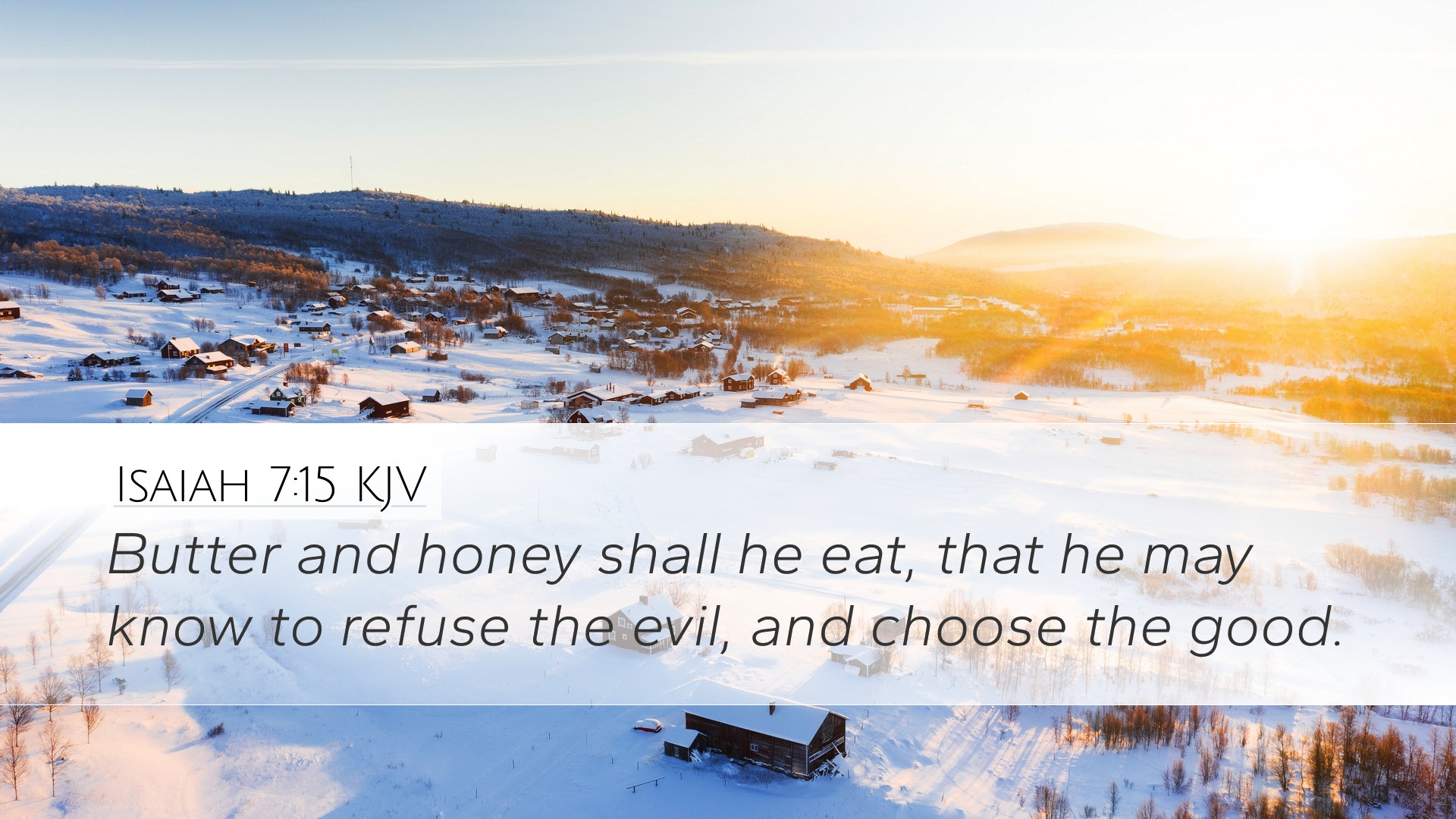Commentary on Isaiah 7:15
Verse Context: Isaiah 7:15 states, "Butter and honey shall he eat, that he may know to refuse the evil, and choose the good." This passage is significant within the broader narrative of the book of Isaiah, a prophetic book filled with messages of judgment and hope. In this verse, the focus is on the future Immanuel, indicating a time of learning and moral discernment.
General Interpretation
This verse highlights the early formative experiences of a child who is destined to be significant in God's plan. The reference to “butter and honey” implies a time of simplicity and abundance, symbolizing God's provision and the care that accompanies a time of peace.
Insights from Matthew Henry
Matthew Henry emphasizes the significance of the terms used in this verse, interpreting “butter and honey” as indicative of a diet that reflects simplicity yet richness. He suggests that this diet represents a life of grace and the blessings of God, nourishing the child, leading to spiritual and moral maturity.
Henry points out that the clause “that he may know to refuse the evil, and choose the good” signifies a crucial developmental stage in the life of everyone, particularly those chosen by God for significant roles. It underscores the importance of moral discernment and the ability to make righteous choices from an early age.
Insights from Albert Barnes
Albert Barnes expands on the symbolic nature of the dietary references. He articulates that the simplicity of the food symbolizes a time of peace and plenty, contrasting with the political turmoil of the times. He notes that the child’s ability to refuse evil and choose good is not merely a developmental milestone but also a divine preparation for future responsibilities.
Barnes further explains that this passage not only predicts the growth of an individual but also affirms God's sovereignty in providing the moral framework necessary for the righteous governance of Israel. This prophetic insight suggests that the child will possess the wisdom to navigate through life’s complexities with discernment.
Insights from Adam Clarke
Adam Clarke interprets "butter and honey" as a reference to the blessings of the land of promise, symbolizing the richness of God's providence. He highlights that the diet mentioned indicates a fledgling nation's context and serves as a reminder of God's faithfulness to His covenant people.
Clarke looks at the phrase “that he may know to refuse the evil, and choose the good,” emphasizing the moral instruction involved in such early beginnings. He argues that moral choices are fundamental in forging one's character and future. The imagery serves to convey the importance of divine teaching in the formation of one's identity and moral compass.
Theological Implications
This verse raises important theological insights about the nature of God's providence and the way divine care nurtures the future leaders and the faithful community. The mention of basic dietary needs reflects a broader spiritual truth about reliance on God for sustenance and wisdom in choosing righteousness over wickedness.
- Divine Guidance: The concept that God prepares individuals with moral clarity from an early stage underlines the importance of spiritual nurturing in all believers.
- Moral Development: This passage implies that maturity involves a conscious effort to reject evil and embrace good; hence, the role of education—both in the secular and spiritual sense—is paramount.
Practical Application for Pastors and Theologians
For pastors, this verse serves as a reminder to teach congregants about the significance of spiritual nourishment and the lifelong process of learning to discern good from evil. It can challenge church leaders to consider how early life experiences and spiritual teachings shape moral decision-making.
- Educating the Young: Highlighting the importance of nurturing moral values and a deep understanding of scripture from childhood can inspire ongoing discipleship efforts.
- Covenantal Trust: Emphasizing God's providence can encourage congregants to trust in the Lord in turbulent times, reflecting on the context within which Isaiah prophesied.
Conclusion
Isaiah 7:15 encapsulates profound truths about divine provision, moral discernment, and the importance of a nurturing environment for spiritual growth. Such understanding lends rich insights into the holistic development of believers, urging both personal and communal reflection on the paths chosen in life.


